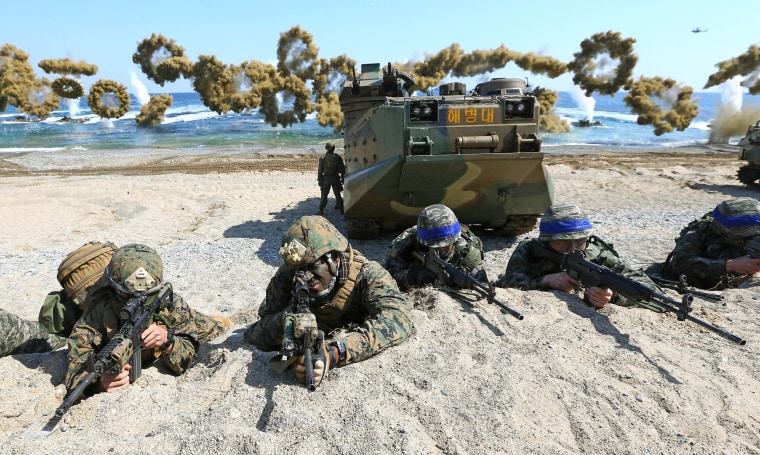The U.S. announced an end to its annual large-scale joint military exercises with South Korea on Sunday, confirming an NBC News report.
On Friday, two U.S. defense officials told NBC News that the exercises are being curtailed as part of the Trump administration's effort to ease tensions with North Korea, which has always viewed the joint drills as an invasion rehearsal.
The news comes just days after nuclear talks between President Donald Trump and North Korean leader Kim Jong Un broke down with no agreement.
South Korea's National Defense Minister Jeong Kyeong Doo and the acting U.S. Secretary of Defense Patrick Shanahan agreed to end the two major joint military drills — known as Key Resolve and Foal Eagle — over the phone on Saturday, the Pentagon said in a statement.
They will be replaced by smaller training exercises.
The pair “made clear that the alliance decision to adapt our training program reflected our desire to reduce tension and support our diplomatic efforts to achieve complete denuclearization of the Korean Peninsula in a final, fully verified manner,” the statement said.
The new training, dubbed “Dong Maeng,” which means “alliance” in English, starts Monday through March 12.
It will focus on “strategic operational and tactical aspects of general military operations on the Korean Peninsula,” South Korea’s military and the U.S.-South Korean combined forces command said in a joint statement.
There are 28,500 U.S. troops currently stationed in South Korea.
Since taking office, Trump has repeatedly complained about the large-scale exercises, saying they're too costly and the U.S. bears too much of the financial burden.
After the unsuccessful summit with Kim earlier this week, Trump said the annual military drills were "very, very expensive" and the government in Seoul should pay more for them.
U.S. officials told NBC News the decision to cancel large-scale drills is not related to the summit in Hanoi, but has been under consideration for some time.
The military has carried out the major exercises as much for deterring the North Korean regime as maintaining troop readiness, according to senior defense officials.
Some experts on North Korea questioned whether the major exercises can be suspended without significantly affecting the troops' ability to combat threats.
Following his first summit with Kim in Singapore last June, Trump announced that the U.S. would suspend large-scale joint military exercises, but smaller exercises and training have continued.
While the U.S. has pulled back on its exercises, North Korea has pressed ahead with its own drills.
Gen. Robert Abrams, commander of U.S. forces in Korea, recently testified that North Korea was preparing to carry out its annual winter cycle of training with one million troops.
The Key Resolve exercise was usually held in March and ran for about two weeks, overlapping with Foal Eagle, which ran for about a month.
These annual exercises involved thousands of troops, with ground, air and naval forces from the United States and South Korea, as well as contingents from Australia, Britain, France and other countries.
The exercises coincided with the rotation of South Korea troops, whose annual assignments change over at that point.
The Korean Peninsula remains in a technical state of war because the 1950-53 Korean War ended with an armistice, not a peace treaty.



